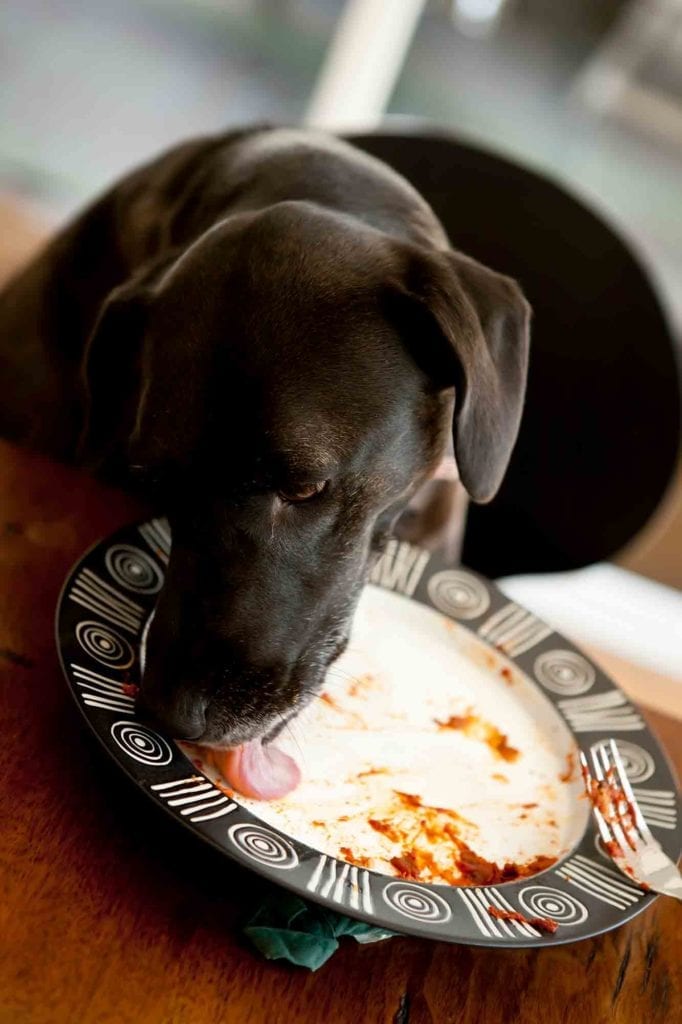 Picture this: a couple of hours after the big Thanksgiving meal you are settled comfortably in front of the football game when you notice some odd noises coming from the kitchen. You hurry in to see what’s going on and find your sweet, normally well-behaved dog greedily rummaging through the leftovers you’ve just thrown away.
Picture this: a couple of hours after the big Thanksgiving meal you are settled comfortably in front of the football game when you notice some odd noises coming from the kitchen. You hurry in to see what’s going on and find your sweet, normally well-behaved dog greedily rummaging through the leftovers you’ve just thrown away.
This common scenario seems innocent enough, but high fat table scraps can lead to pancreatitis in pets, a scary condition that all pet owners should be aware of.
The Role Of The Pancreas
The pancreas is a glandular organ adjacent to the stomach and small intestine. Its role is to secrete digestive enzymes into the stomach and to produce insulin, a hormone responsible for regulating blood sugar.
Pancreatitis occurs when the pancreas becomes irritated and inflamed, disrupting its normal process. An inflamed pancreas secretes its digestive enzymes too early, which can result in tissue damage and/or death. Diabetes can also result due to the damaged pancreas’ inability to regulate insulin levels.
What Causes Pancreatitis In Pets?
There are a variety of factors that can result in pancreatitis in pets, including tumors, trauma to the pancreas, or certain medications. The most common cause, however, is a sudden high fat meal. Even small amounts of fatty foods such as poultry skin, ham, gravy, or certain baked goods (all common holiday indulgences) can lead to this dangerous inflammatory condition.
Signs And Symptoms
The symptoms of pancreatitis in pets can range from mild to severe, and in some instances may be life-threatening if not treated promptly. Seek veterinary care if your pet is experiencing any of the following symptoms:
- Repeated vomiting
- Signs of abdominal pain (hunched back, reacting with pain when touched)
- Diarrhea
- Fever
- Loss of appetite
- Lethargy
- Breathing difficulties
Treatment of pancreatitis is generally supportive, and may include IV fluid support, pain management, and a prescription diet or other food intake modification.
Prevent, Don’t Treat
As with most illness, preventing pancreatitis in the first place is preferable to treating it. One of the best ways to help keep your pet from developing pancreatitis is to make sure he or she doesn’t have access to food scraps, especially around holiday time when our homes are typically filled with lots of food and guests.
Most pets won’t hesitate to help themselves to unattended food, even out of the garbage can. Keep your fur friend safe from pancreatitis this holiday season, and all year long, with our tips:
- Don’t feed table scraps to your pet, and make sure guests don’t either
- Don’t leave pets unsupervised around plates of food, appetizers, leftovers, etc.
- Put leftovers away immediately, or close off the room from pets until you can clean up the food
- Place garbage in a covered bin, or take it outside (and make sure that bin is tightly covered, too)
Do you have any concerns about pancreatitis in pets? Please don’t hesitate to contact your partners in pet care at Schertz Animal Hospital.
Recent Posts
About Us
We know that choosing the right veterinarian for your pet (and you) can be a challenge. Yet, with our stress-free handling, our long-term, experienced staff, and a state-of-the-art facility, we make the decision an easy one!
